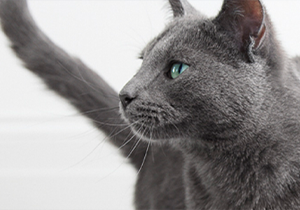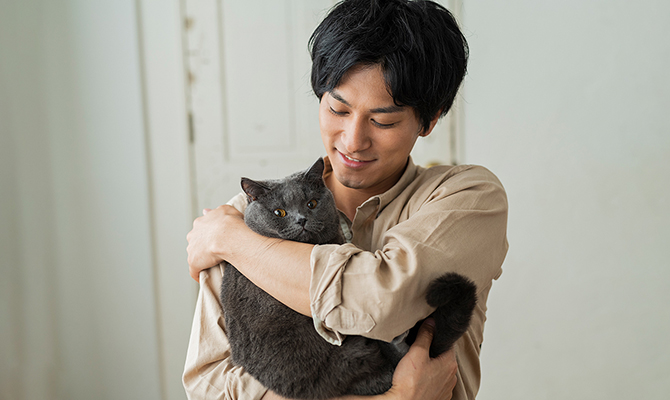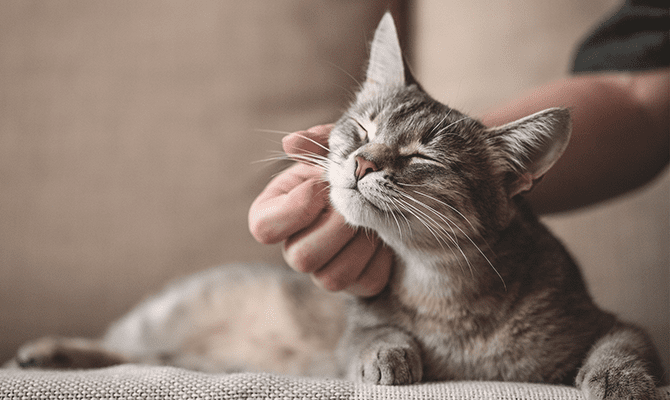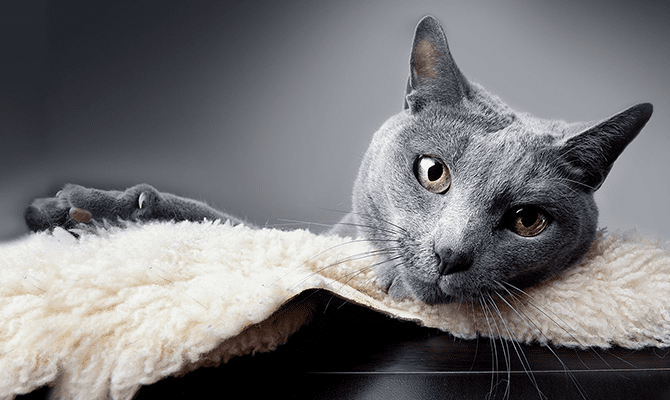Why Is My Cat Losing Weight?
If you are a cat lover, it should not be a surprise to you that these enigmatic felines come in different shapes, sizes, coat colours, and yes, weights! The weight of a cat can change depending on its age, and lifestyle, but when it comes to maintaining the perfect weight, the ideal weight of an adult, healthy cat should vary somewhere between 4kgs to 4.5kgs. Though this is not the case for all cats as larger cat breeds like Maine Coons can weigh considerably more, as high as 11kgs. However, as a cat parent, it is normal to be concerned whether your kitty is an adequate weight for its age and breed or to worry if they are getting too skinny or too obese.
In case of malnutrition, it is generally advised to increase their regular caloric diet by serving cat food for weight gain. However, most cats fail to show much restraint when it comes to food. So, though they start gaining weight with increased calories, it is often a slippery slide to becoming overweight. And obesity is a common disorder in felines, making safely gaining weight in cats a real challenge.
On the flip side, being underweight might affect your cat’s normal lifestyle, leading to difficulties during the growing years such as hormonal imbalance, fatigue, and more. In addition, rapidly losing weight is a worrisome symptom as it may indicate serious health issues, such as inflammatory bowel disorders, food allergies, infections, or even feline cancer!
So, let us discuss the ideal cat weight and how as a parent you can help your feline buddy reach its appropriate weight.
Reasons for weight loss in cats
-
Parasites
Cat losing weight due to the effects of intestinal parasites is quite a common occurrence. Parasites are living, worm-like creatures that often enter the host's body through the mouth or the skin, causing infestations. Roundworms such as Toxascaris Leonina and Toxocara Cati are the most common types of feline parasites that can be found in a cat’s intestines. These parasites affect almost 25% to 75% of cats, causing diarrhoea, bloating, and vomiting. Generally, cats get parasites while walking through a contaminated area. It is also possible for pregnant cats to pass these parasites to their kittens through milk or colostrum. If you suspect parasitic reactions in your cat, it is important to visit a veterinarian immediately. Thankfully, it is easy to get rid of parasites, and veterinarians generally suggest deworming which can put the cat back on the right track to becoming healthy.
-
Kidney diseases
Like all other mammals, the kidneys in cats have a vital role to play, from helping manage blood pressure, and balance hormones, to being responsible for red and white blood cell stimulation in bones. Any health issue concerning the kidneys can result in drastic weight loss for cats. There can be two types of kidney problems, acute renal failure which is caused by ingesting toxic substances such as chocolates, and chronic kidney problems, which mainly occur in cats older than 7 years. These diseases are diagnosed through bloodwork and urinalysis. So, if your cat is losing weight, it might be time to get it tested for renal issues. The treatment for kidney diseases includes diet, medicine, and a lot of sterile fluids.
-
Hyperthyroidism
Hyperthyroidism can be a potential cause for your cat to lose weight too. It is a result of the thyroid gland producing the thyroid hormone in excess, which increases the appetite but results in reduced weight. Other very common symptoms of hyperthyroidism include diarrhoea, hyperactivity, vomiting, urinating and drinking more than normal. Hyperthyroidism often leads to complicated heart diseases and high blood pressure. So, it is best to go to a vet as soon as you notice any of the symptoms.
-
Diabetes
Diabetes is also a common reason behind cats losing weight. If diabetic, the body of the cat stops responding or generating insulin which can lead to the accumulation of a lot of sugar in the body in the form of glucose. Due to a lack of insulin, this excess glucose is broken down by utilising fat and tissue cells, which can lead to weight loss. Diabetes has two major symptoms, excessive urination and an increase in thirst. Since diabetes can lead to several concerning health issues in future, it is important to get your kitty checked out if you suspect diabetes.
-
Gastrointestinal issue
Cats losing weight rapidly can stem from gastrointestinal (GI) issues. Cats often suffer from various gastrointestinal diseases such as food poisoning and infections, parasitic or bacterial actions, and inflammatory bowel diseases. Gastrointestinal diseases often manifest as symptoms like excessive vomiting and diarrhoea, frequent urination, and indigestion, leading to weight loss. Cats suffering from gastrointestinal issues are unable to naturally produce digestive enzymes in their bodies and therefore cannot digest their normal diet. In such cases, weight loss is caused due to their bodies not receiving the proper nutrients needed for maintaining an ideal weight.
-
Chronic pain
Chronic pain often leads to weight loss in cats. Chronic pain or discomfort is usually indicative of serious health concerns that require immediate professional intervention. It can also lead to stress and loss of appetite which can cause your cat to avoid eating and lose weight rapidly. Dental problems are also potential reasons for chronic pain and are associated with problems while eating. Chronic dental pain can cause cats to reduce or completely give up eating and drinking despite being hungry, causing malnutrition and loss of weight. Decreased interest in eating, playing, or interacting might suggest chronic pain that requires medical support.
-
Depression or stress
While cats are probably some of the most chill and confident creatures to have ever existed, they are also prone to depression and stress. Cats do not do well with frequent changes such as shifting houses and take a long time to get acclimated to a new place. And while they are still figuring out the environment of their new habitat, it is easy for them to get stressed and even depressed. And depression can cause your feline buddy to abruptly change their eating habits and rapidly lose weight. So, if you see signs of depression and stress in your feline, make sure to shower them with all the love and affection to help them feel better soon!
Identifying if a cat is too skinny
-
Body condition score
The cat body condition score (BCS) is a rather contemporary concept that was designed to figure out whether a cat is underweight, normal, or overweight. The score is used to grade a cat between 1 to 9 depending on its appearance. While a score of 1 to 3 is considered to be underweight, scores exceeding 6 indicate obesity. A score ranging between 4 and 6 is suggestive that the cat has an ideal weight.
-
The hand test
The hand test is a popular method of determining whether a cat is in perfect shape or is too obese or underweight. To conduct the hand test, you can use your fingers to feel your cat’s ribs, located behind the front legs. Your cat is in good shape if the ribs feel like the back of your hand. However, if the ribs can be distinctly felt, or feels like the knuckles, it is suggestive of being underweight. A cat can be considered obese if you cannot feel its ribs by performing the hand test.
-
Visual inspection
Visual inspection is the easiest way of assessing your cat’s weight based on its appearance. You can observe your cat’s waistline by looking at your cat from above. Cats have a visible waistline between their ribcage and their hind legs. Ideally, cats should have a narrowing space between their ribs and their hindquarter if they have an ideal weight. If this space appears too narrow, it might mean your cat is underweight. A broad or missing waistline indicates obesity.

Is your cat showing signs of depression?
-
Appetite loss
Appetite loss is one of the most prominent symptoms of depression. A cat’s body language can drastically change under stress or depression, making an impact on its eating habits. While stressed, cats usually enter a state of continuous alertness, often ignoring food and water. Depression can also lead to gastrointestinal conditions like nausea and abdominal pain which can further lower appetite.
-
Lack of physical touch
Though cats are often seen to prefer their independence around new people or strangers, they are, in reality, real softies around their favourite humans, continuously asking for attention or physical affection. So, if your cat is suddenly acting aloof and not responding to physical touch or avoiding it, it might be caused by stress or depression.
-
Sleeping more than usual
Depression and stress can sap away all the vitality and energy from your feline’s body, leaving it physically and emotionally exhausted. Depressed cats often show symptoms such as changed body language, lethargy, and nausea. To overcome physical exhaustion or to conserve the little energy they are left behind, your feline friend might sleep for a longer time than usual.
-
Change in bowel movement
As depression and stress have a considerable effect on your kitty’s gastrointestinal system, it is not uncommon to observe a change in their bowel movement if your cat is under stress or depression. So, if your cat is anxious, it can start showing symptoms of gastrointestinal issues, such as a change in bowel movement, fatigue, loss of appetite, indigestion, frequent vomiting, and diarrhoea.
-
Hiding away
Cats do not do well with changes, and it is possibly the biggest reason behind feline stress and depression. And while it may take your feline friend some time to warm up again or to get adjusted to the changes, you can notice prominent changes in its body language, including hiding away or escaping into corners or small, confined spaces. This is because while cats are depressed, they are continuously alerted by their immediate environment, and prefer to hide away to avoid unknown dangers.
-
Lack of energy
Stressed and depressed cats often give up eating and drinking, which can lead to nausea and physical weakness. Moreover, mental anxiety can leave cats feeling quite exhausted which takes a toll on their physical activities as well. So, if you see your cat seem out of its usual playful nature, or slumping down frequently, it might be a result of depression.
Ways to put on weight in cats
-
Increase the number of meals
Wondering how to fatten up a cat? Food is undoubtedly one of the best ways to restore all the weight your feline buddy might have lost. And since cats are awesome foodies, it should be relatively easier to help your cat gain weight by increasing the number of meals.You can offer cat treats to your kitty to bring in some variation.
-
Separate bowls in case of multiple cats
What is better than a cat? Two cats! However, if you have multiple cats, it is a good idea to separate their food bowls. It is not unusual for cats to fight over the larger share of meals hence separating the bowls makes sure that all of your feline buddies are getting equal portions. In addition, the separation of food bowls also reduces the risks of diseases that are spread through transmission.
-
Location of the food bowl
Placing the food bowl where it is not easily accessible by your kitty can be a potential reason why your feline friend is losing weight. Cats are also generally tidy and extremely particular about where they eat and hence putting the food bowl next to the litter tray might not make your cat feel very comfortable while eating. So, make sure to place the food bowl on a clean, open surface that is accessible.
-
A mix of wet and dry cat food
Cats are picky eaters. So, if your cat is refusing to eat dry cat food, it might be time to start mixing the dry cat food with some delicious wet cat food and watch your kitty lick its bowl clean! In addition, mixing dry and wet cat food for weight gain together makes sure that your cat is well-nourished and hydrated.
-
Heat the food
Simply heating the wet cat food before offering it to your cat might entice them to eat more. Heating also helps release the delicious fragrance from wet, making the meal extremely appealing to kitties. It might be a little extra effort, but warming wet cat food can help your kitty gain weight.
-
Try hand feeding
Stress and depression are potential reasons behind cats losing weight caused by loss of appetite. However, your cat still needs adequate nutrients and hydration to stay healthy, so hand feeding can go a long way in coaxing them to eat. Also, by hand-feeding, you can show affection to your kitty which can help foster a deeper, precious bond.
-
Weight gaining supplements
If your cat has lost too much weight, it is important to look into weight gain for cats supplements to help them to gain weight soon. However, you should consult your veterinarian before introducing weight-gaining supplements, since weight-gaining supplements contain concentrated calories and might cause obesity if fed more than the prescribed amount.
FAQs
-
What should I feed my underweight cat?
Underweight cats usually do not require special cat food for weight gain. However, you can increase the amount of their everyday intake amount or increase the frequency of their meals. However, if your cat has drastically lost weight, your veterinarian might suggest weight-gaining supplements with concentrated calories.
-
Why is my cat eating a lot but not gaining weight?
If your cat is eating a lot but still not gaining weight, it might be a clear symptom of hyperthyroidism. Hyperthyroidism results in the excessive production of the thyroid hormone, which increases the appetite in cats, but can cause diarrhoea, vomiting, and nausea, leading to little or no weight gain for cats.
-
What is an appetite stimulant for cats?
If your cat is continuously losing weight, you might be concerned about how to fatten up a cat. An appetite stimulant is a chemical supplement prescribed by veterinarians. It often causes cats to feel hungry so that they can eat properly and maintain their caloric intake.
-
Do cats get bored of eating the same food?
Yes, cats often do get bored of eating the same food which might affect their appetite. Sheba premium wet cat foods are available in different textures and exotic flavours such as tuna, salmon, beef, pork, and shrimp can bring a variation to your cat’s meals.
-
What food helps a cat gain weight?
Cats require high calory cat food to help gain weight. You can increase the amount of food they eat to help them gain weight. Since cat treats are rich in calories, you can offer your kitty delicious cat treats of their choice for some extra caloric intake too. Weight-gaining supplements containing concentrated calories can also be fed, but only if they are prescribed by a veterinarian.










